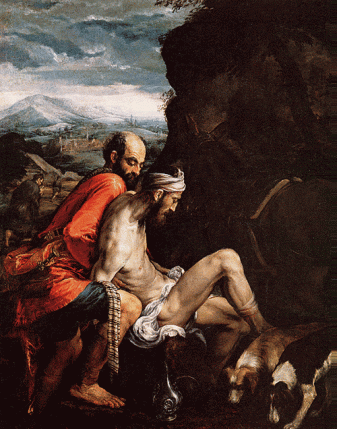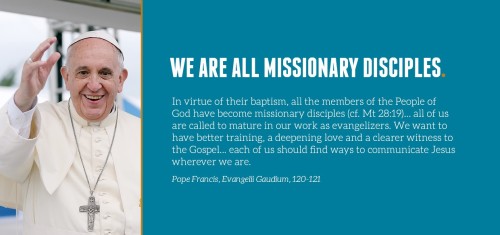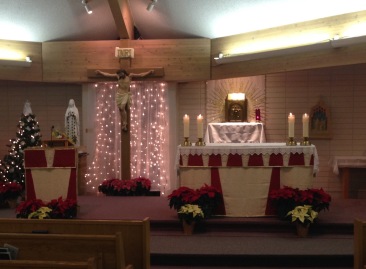Audio: https://soundcloud.com/pereroger/doyouloveme (Follow me on SoundCloud!)
Acts 5:28-32, 40b-41 Ps 30 R/. I will extol you, Lord, for you have raised me up. Rev 5:11-14 Jn 21:1-19
In our Gospel passage today we continue with the accounts of Jesus’ apparitions after the Resurrection. Once again, John doesn’t disappoint with his carefully worded retelling of the encounter. The whole scene ties in several previous key events the disciples experienced with Jesus.
We begin with the disciples — including Simon, James and John — fishing on the Sea of Galilee, but without catching anything throughout the night. Jesus is on the shore. This scene reminds us of their call to discipleship (Mt 4:18-22).
As Jesus tells them to cast their nets again, it recalls the miraculous catch of fish (Lk 5:1-11), when Peter made his first profession of faith — Go away from me, Lord, for I am a sinful man! (Lk 5:8).
Ashore, Jesus invites them to eat bread and fish; this brings up the miracle of the multiplication of the loaves and fish (Jn 6:1-13), which began the discourse on the Bread of Life.
The mention of a charcoal fire (Jn 18:18) recalls Peter’s triple denial of Jesus during the Passion (Lk 22:64-62; Jn 18:15-27). The three questions that follow reinforce this connection.
Finally, Jesus speaks directly to Peter calling him Simon, son of John (v. 15), recalling Peter’s elevation as chief of the Apostles, when he’s given the keys (Mt 16:18).
I mention these things briefly because I think they’re important for us to keep in our hearts and minds as we hear the words of our Gospel today. John subtly recalls them so as to help us to understand what Jesus is saying and doing in this final encounter.
You see, the key part of our Gospel passage is precisely this interchange between Jesus and Peter; everything else serves to help us make sense of it. Having denied Jesus three times, Peter must now profess his love for Jesus three times; having run away from Jesus’ Passion, he must now embrace the passion that awaits him. And all of this Peter will do by loving Jesus to the end, and by humbly and faithfully caring for the flock of Christ — that is, the Church — now entrusted to his care.
Jesus gave Peter the keys to loose and to bind; now he’s being told about what that’ll look like: self-sacrificial love (for God and for others) — Simon son of John, do you love me more than these? (Jn 21:15); and, He said this to indicate the kind of death by which he would glorify God (Jn 21:19).
This love will be expressed not merely through Peter’s death, but also in his care for the Church, by tending and feeding the sheep. Here I think John is tying-in his previous mention of the fish and loaves: Peter must feed the flock of Christ with the Eucharist and help them to follow Jesus.
But there’s another aspect here that’s lost in the English language. When Jesus questions Peter, they’re not using the same words. The details are lost in English because we only have one word for love, but the Greeks have at least four words, each describing a different kind of love or relationship.
Jesus asks Peter, do you love me? — do you [agape] me? Agape is a selfless, sacrificial, unconditional love (cf. DCE, 7). So Jesus is really asking Peter, ‘do you love me with your whole heart? Will you die for me as you once said you would?’ (Mt 26:33).
Peter, on the other hand, responds with another word, philia, which is a friendship kind of love: ‘Yes, Lord; you know that I [like] you’, or ‘you know that I’m your friend’. This contrast also appears in the second question and answer.
In the third question, Jesus mercifully lowers His expectations and changes His question to match Peter’s language: do you [philia] me?, that is, ‘do you like me?’ Obviously not catching on to the differences, Peter responds in a wounded manner, Lord, you know everything; you know that I [like] you.
Jesus mercifully lowers His expectations because He sees that Peter doesn’t yet understand and can’t quite raise himself to say it, but that he will in due time. Peter wasn’t ready for agape — for a selfless, sacrificial, unconditional love — on that morning by the Sea of Galilee, but he certainly was by the time he joyfully laid down his life in Rome nearly 35 years later. Jesus accepted Peter where he was at so that He could help him to grow into what he should be.
My brothers and sister, the Lord Jesus does the same for us: He consistently invites us to the high dignity of discipleship, even when He knows it often seems beyond our capacities. But He doesn’t stop inviting us if we’re not yet ready to love Him as He desires us to. Instead, like He did with Peter, Jesus is patient with us and is willing to walk with us along the path to perfection. He doesn’t give up on us, but walks with us.
We don’t need to fear that we’re not where Jesus wants us to be. We don’t need to fear we can’t do what Jesus asks us to do. He’s patient with us. But we can’t give up either: we can’t just walk away because what Jesus asks is challenging. And we can’t just sit back and expect that Jesus will accept us if we do nothing. He invites us, but we need to respond in order to receive the gifts He has in store for us. Our ‘yes’ doesn’t need to be perfect, but we do need to open the door at least a crack in order for Him to enter.
Peter didn’t stay stuck in his inability to love Jesus perfectly. Rather he loved Jesus as he could, and through that love, Jesus drew him closer, and perfected his love. When Jesus calls us to follow Him, we need to respond to the best of our capacity. We can’t just mope and wallow in self-pity because we’re not as good as He wants us to be. Rather, like Peter, we need to offer Jesus what it is we do have, what it is we can do right now, and then allow Him to lead us to a deeper love, a stronger commitment, a holier way of life.
Jesus invites us to perfection, but He accepts what we can give Him. The key is that we have to give what we have, and let Him raise us up. Are we ready to do that? Are we ready to follow Jesus with what we have? Are we able to let Him change and transform us, so that we, too, can love Him perfectly with an agape love?
Through the Sacraments, the help of the Holy Spirit, and the intercession of Mary and the Saints, may we be lifted up by the grace of Christ to become what He calls us to be: one with Him in the love of the Father. Amen.
 It’s been a while –– I’ve stopped writing our my homilies and recording them has been a bit challenging, so there hasn’t been much to post. I’ll work on it. In the meantime, I’ve added some other audio files.
It’s been a while –– I’ve stopped writing our my homilies and recording them has been a bit challenging, so there hasn’t been much to post. I’ll work on it. In the meantime, I’ve added some other audio files.






 And this is why now we celebrate this Sunday the mystery of the Most Holy Trinity,
And this is why now we celebrate this Sunday the mystery of the Most Holy Trinity,
